CST Blog
Antisemitism and the Left: what does the new report from CST and JPR tell us?
14 September 2017
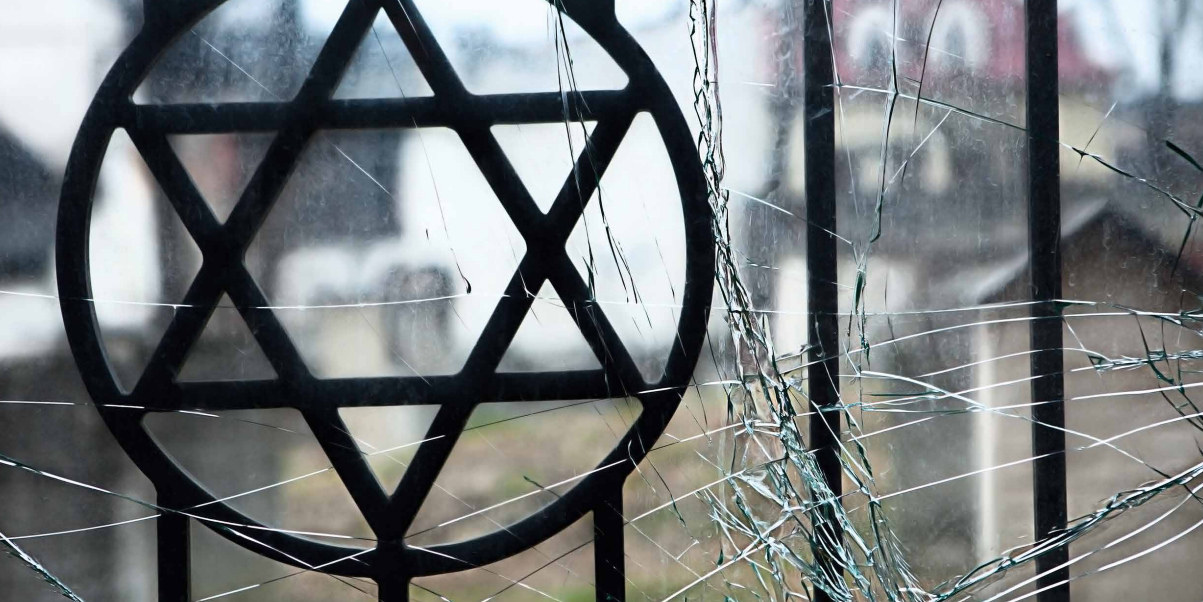
This week CST and the Institute for Jewish Policy Research published a major new study of antisemitism in Great Britain, based on the largest-ever survey of attitudes towards Jews and Israel in this country. The report can be downloaded here and you can read more about it here.
The report launch featured a panel discussion that included CST's Dave Rich, who spoke about what the report's findings tells us about antisemitism on the left and its relation to anti-Israel attitudes. This post is based on the comments he made at the launch:
There’s so much in this report but I’m going to highlight 2 or 3 points regarding what it says about the left and about anti-Israel attitudes, and how this relates to what has happened with the Labour Party and antisemitism.
Firstly, it shows that the left is just as antisemitic as the rest of society – no more and, crucially, no less. The proportion of actual fully-formed, conscious antisemites is roughly the same as in wider society – around 3-4% - while around 30% of people who identify as left wing hold at least one antisemitic attitude, the same as society as a whole. The survey also asked about which political parties people support, and found that most people on the left, and especially on the far left, support the Labour Party. So the idea we sometimes hear in defence of the Labour Party when antisemitism is raised, that the left, or the Labour Party, is a pure anti-racist space where antisemitism can’t happen is shown to be completely untrue. It is as easy to find antisemitism there as it is anywhere else. When Jewish people complain that they have heard antisemitic comments from people on the left, or seen Labour Party supporters or members posting antisemitic memes on social media, this isn’t a Blairite plot to undermine Jeremy Corbyn or a Zionist trick to silence critics of Israel – it’s real, they are telling the truth and should be taken seriously.
This antisemitism is linked to anti-Israel attitudes, because, as this table shows, the more anti-Israel somebody is, the more likely they are to also hold anti-Jewish attitudes – and the left as a whole is more anti-Israel than the general population.
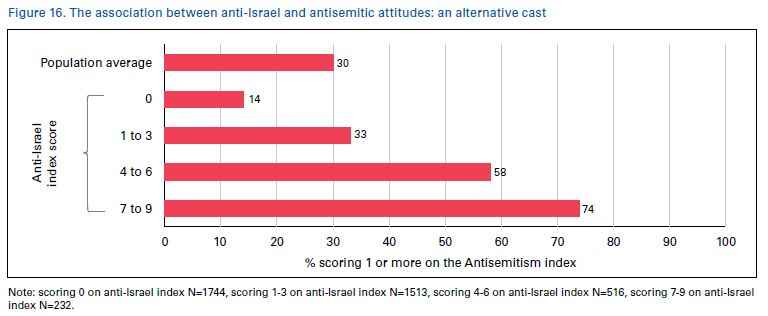
The top red bar in this table shows that 30% of the UK population hold one or more antisemitic attitude; the other red bars show this percentage according to how anti-Israel a person is. As this table shows, the more anti-Israel attitudes a person holds - from 0 to a maximum of 9 in this survey - the more likely they are to also hold at least one antisemitic attitude.
I want to focus in on one particular group: those people in the survey with strongly antisemitic attitudes. These are the people who agreed with most or all of the anti-Israel statements in the survey: people who believe that Israel is an apartheid state that is committing mass murder in Palestine and should be boycotted, that Israel has too much control over global affairs and is the cause of all troubles in the Middle East, and so on. These people are much more likely than the average person to believe or express at least one antisemitic thing about Jews – three quarters of them hold at least one antisemitic attitude, compared to 30% of the population as a whole. Now, who are these strongly anti-Israel people, and where would you find them? I’m going to suggest that activists in anti-Israel organisations are likely to be strongly anti-Israel, and to agree with most of the anti-Israel statements in this survey. These would be the people who organise and go on anti-Israel demonstrations, run their stalls in town centres and argue their case on social media. The anti-Israel statements in this survey are common themes in the discourse of anti-Israel organisations in this country. And when those people do argue with pro-Israel people – many of whom will be Jews – quite often, the antisemitic viewpoint that most of them hold is likely to come out.
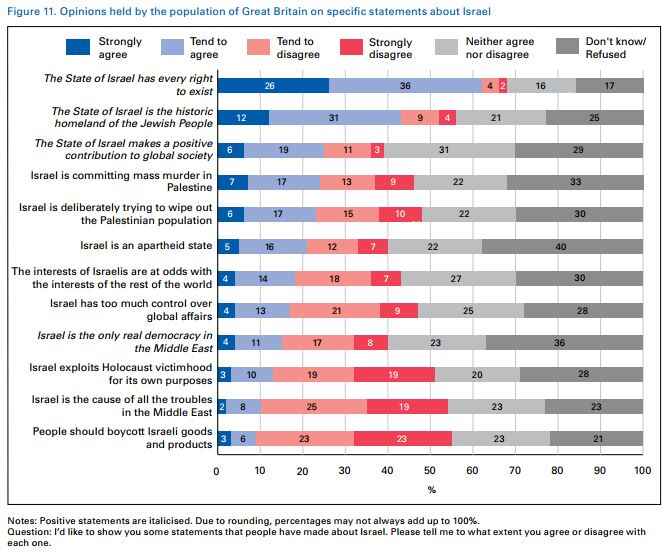
The survey deliberately did not ask whether people agreed with ordinary political criticisms of Israeli policies, as previous survey work, for example by the EU Fundamental Rights Agency (FRA) in 2012, has found that most British Jews do not consider ordinary criticism of Israel to be antisemitic. Instead, it asked about anti-Israel attitudes that resemble some of the anti-Jewish attitudes included elsewhere in the survey; and it asked about anti-Israel attitudes that most British Jews consider to be probably or definitely antisemitic (also according to the 2012 FRA survey).
Interestingly, the most common antisemitic attitude held by strongly anti-Israel people is different than for the population in general. The antisemitic attitude most commonly held by the UK population as a whole is that “Jews think they are better than other people” - which 13% of people agreed with in the survey. Not a pleasant view, and one that fits with a vague xenophobic bigotry towards Jews. However, for strongly anti-Israel people it was quite different. People with strongly anti-Israel attitudes, if they agreed with any of the antisemitic statements, were most likely to agree that “Jews exploit Holocaust victimhood for their own purposes.” Fully 49% of people with strongly anti-Israel attitudes agreed with this idea.
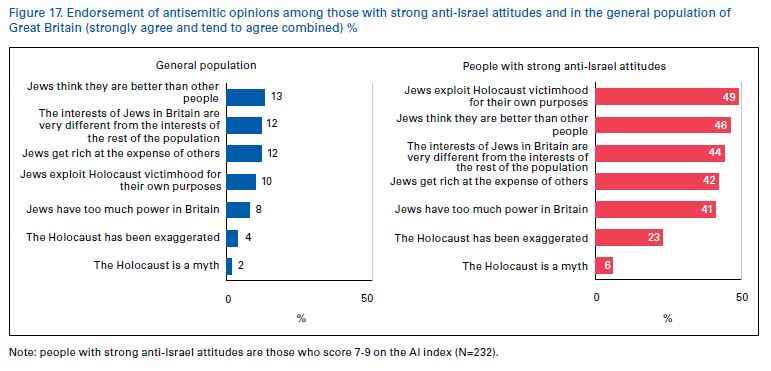
This is significant. Firstly, it is a more politicised allegation that fits with a broader hostility on the anti-Israel left to mainstream Holocaust commemoration; but also, it resonates with what we saw in some of the high-profile cases of antisemitism in the Labour Party over the past year or so, when prominent figures in Labour and in Momentum repeatedly abused the memory of the Holocaust as part of their anti-Israel politics, and offensive distortions of the history and legacy of that period became part of mainstream debate.
The last point I’m going to make is to look at the most extreme fringe of anti-Israel thinking, the anti-Israel attitude with the least support, which is the idea that Israel shouldn’t even exist. Only 6% of people disagreed that the State of Israel has every right to exist, which puts it in roughly the same ball park as the 4% of people who said the Holocaust didn’t happen or was exaggerated. These are parallel ideas at the furthest fringes of far right and far left thinking, just as extreme as each other, and should be treated with similar contempt.
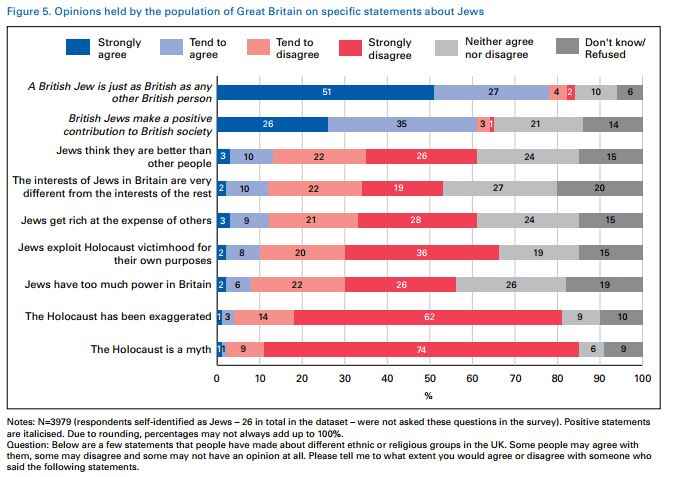
Read More

Antisemitic Incidents Report January-June 2025
6 August 2025

CST Summer Lunch 2025
25 June 2025
CST Annual Dinner 2025
26 March 2025
